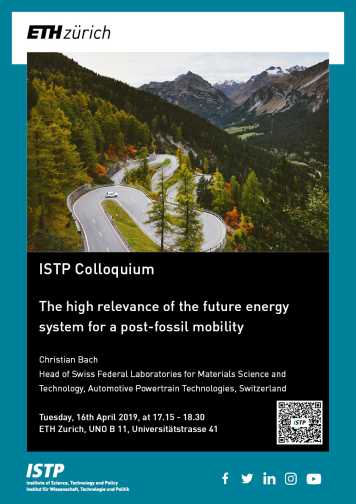Colloquium: Christian Bach
Tuesday, 16th April 2019, at 17.15 - 18.30
ETH Zurich, UNO B 11, Universitätstrasse 41
The high relevance of the future energy system for a post-fossil mobility

To reduce the pollutions from motor vehicle was and is a general policy more or less all over the world. It started in the 1970s in the USA when Smog in cities was hiding the sun and respiratory illnesses increased strongly. The approach was to develop test procedures under defined conditions in exhaust emission laboratories and to reduce the limit values of the pollutants step by step every few years according to the progress in engine and exhaust aftertreatment technology development. All in all, the approach was rated as successful – until September 2015, when the NOx abatement system cut-off functions in passenger cars with diesel engines were discovered (afterwards known as “diesel scandal”). How was this possible?
Looking back, it is clear that the European exhaust emission legislation in force until autumn 2017 was more and more outdated after the year 2000 due to the introduction of advanced engine and exhaust aftertreatment control systems and in addition, the ban of shut-off devices for exhaust aftertreatment systems in the regulation was weak, unclear and was not verified during vehicle certification. Furthermore, on-road tests were missing, although it was known, that NOx emissions of diesel vehicles in real driving were significantly higher than in official laboratory testing. On the other hand, this situation was obviously shameless exploited by the automotive industry in the development of diesel engines. Since autumn 2017, new test procedures for the laboratory test are introduced as well as an on-road test and experts are convinced that the situation is significantly improved. However, millions of over-polluting diesel cars still are on the road in Europe; discussions for driving restriction for diesel cars in cities started or are already effective and high additional economic losses of diesel vehicles at least in some of the markets followed. We should have a high interest not to repeat such a disaster once more.
In the future, the reduction of pollutants remains an important objective, but the reduction of CO2 emissions will be the new focus of automotive powertrain technology development. Corresponding test procedures and limit values have already been established. Bud did we learn from the diesel scandal? Is it ensured that the CO2 legislation leads to a corresponding CO2 reduction in reality? There are at least some open questions since CO2 reduction is much more complex to reduce than pollutant emission due to their strong interfaces and dependency to surrounding sectors. Especially the energy system is highly relevant for the real CO2 reduction in the mobility – but the energy system is completely excluded from the CO2 legislation of road vehicles…
The presentation will give an insight to CO2 emissions of different powertrain concepts, the interaction with the CO2 regulation and the energy system as well to other highly relevant parameter.
About Christian Bach